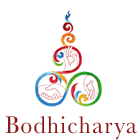Lojong Mind Training
An overall introduction to Mind Training, how to practice Lojong and Tonglen, and how to integrate mind training into daily life. The last session is Questions and Answers.
A SUMMARY
by Maggy Jones
Part 1
Why train the mind? Our actions are controlled by our mind both positive and negative; be aware of this mental activity. Fundamentally our main goal is to be happy but to achieve this we must change our reactions. All Buddhas dharma is based on this; we can learn and transform – as Buddha did. All Buddhism is “Mind Training”; the key points are compassion and wisdom; not only worldly wisdom but transcendental wisdom. To see things as they really are, accept impermanence and take responsibility for our own actions. Bring the concepts from the head into experience. Beneath our cultures we all want the same – recognise this and you too will benefit. Three main points: 1. Letting go of what is causing pain. Negative emotions are also impermanent; wait before reacting. 2. Transformation by invoking the opposite energy, possibly using visualisation. 3. Understanding deeply how your mind works. Your mind is the sea, emotions are the waves.
Part 2
We must also work on our positive side and develop compassion and wisdom. Enlightenment, Buddhahood, is perfected compassion and wisdom. Compassion is deeply wishing to eliminate all suffering and its causes for all beings. The 4 Immeasurable Contemplations (Loving-kindness, Compassion, Joy, Equanimity). These also contain attachment and aversion and do not set us free. Only when we stop wishing freedom from suffering for ourselves will we be free. All positive things come from focusing on others, everything negative from our ego. “Less ‘me’ makes me more free”. Remember, everything is like a dream in essence. Tonglen practice – breathe in all the negative and its causes, and breathe out healing warmth. Q & A
Part 3
Guided tonglen practice. Start with the motivation to free all beings from suffering and the causes of suffering, now and always, and with this intention start your training. Keeping your focus, breathe in all the negative qualities; this will erode all your own negative karma and allow compassion and wisdom to enter. You start with all sentient beings but you can also use it with individuals or groups. It is important to bring this practice into your daily life. You can use tonglen on yourself when stressed. Do not expect instant results, but keep practising and the benefits will come. Q & A
Part 4
We have not followed any particular text but have taken an overall view. Q & A. Pride; can be positive – pride in accomplishments; and negative – arrogance, and refusal to learn. “Vajra pride” is inner confidence and the knowledge that anything can be purified and anyone can become a Buddha. Story of Anguilamara. Intellectual attempts at understanding may lead to nihilism which is the opposite of the nature of reality. Discussion with scientists at Dharamsala: impermanence, why does everything change? Because everything is made of many parts. How do things exist? Interdependence relative to the surroundings. Modern sciences have proved Buddhist “emptiness”. Discussion on meditation and on emptiness.
Recommended Reading: “Mind Training”. Ringu Tulku. ISBN 978-1559392785. Snow Lion 2013
For more information, visit: https://karmapatrust.dk/

